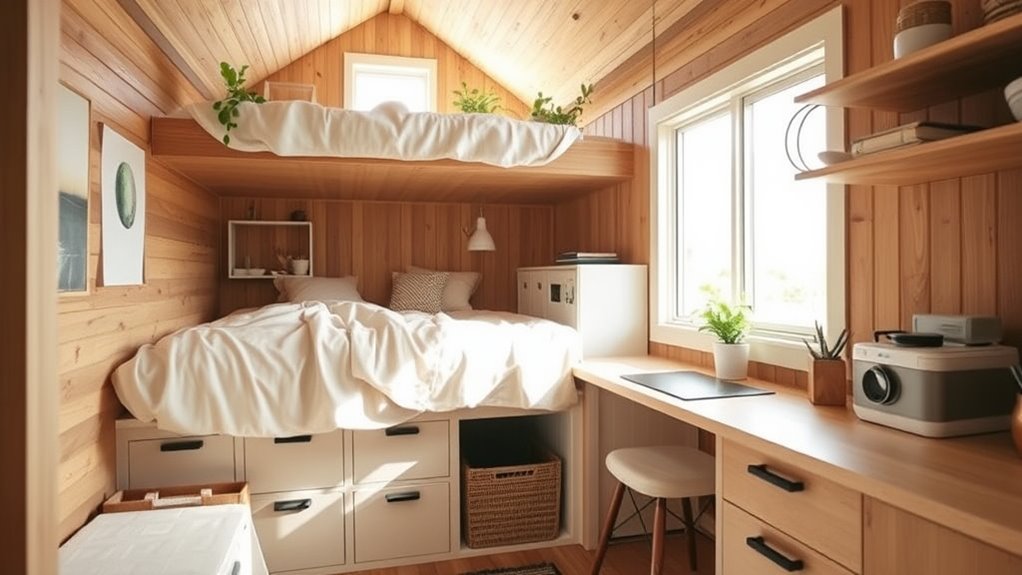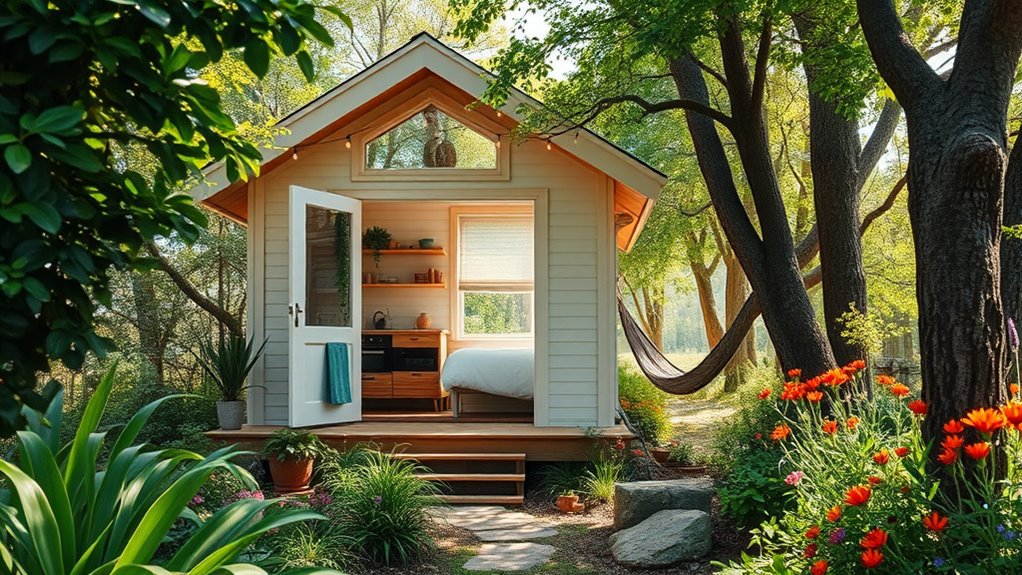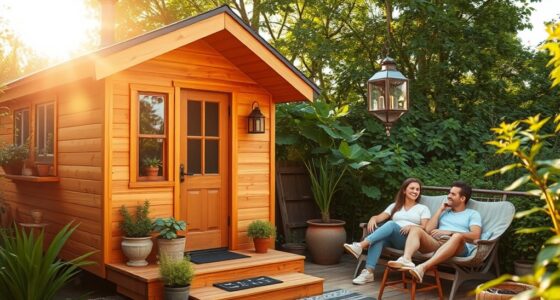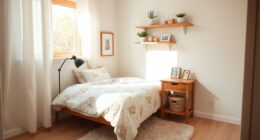Living small has transformed your life by simplifying your environment, cutting down on expenses, and helping you focus on what truly matters. You feel less overwhelmed, more present, and experience less stress from clutter and materialism. Financially, you’ve gained stability and freedom to pursue passions. Your mindset shifts to valuing quality and experiences over possessions, making life more fulfilling. Stay with us to discover how embracing minimalism keeps amplifying these positive changes.
Key Takeaways
- Simplified living reduced clutter, making daily choices clearer and less overwhelming.
- Financial savings from downsizing decreased debt and increased freedom to pursue passions.
- Less maintenance and stress improved mental well-being and fostered mindfulness.
- Greater flexibility for travel and new experiences enhanced personal growth.
- Embracing minimalism shifted my values toward meaningful connections and authentic happiness.

Have you ever considered how downsizing your life can lead to greater happiness and freedom? When I first thought about simplifying my space, I didn’t realize how much it would transform my entire outlook. Embracing tiny home living became a turning point, revealing the many minimalism benefits that come with living small. It’s not just about reducing clutter; it’s about creating a lifestyle centered around what truly matters. Once I let go of excess possessions, I gained a clearer focus on my priorities, which made everyday choices simpler and more intentional. Living small meant I no longer wasted energy maintaining a large home or managing unnecessary belongings. Instead, I invested that time and mental space into experiences, relationships, and personal growth.
Embracing tiny living transforms priorities, simplifies choices, and fosters genuine happiness through minimalism.
The beauty of tiny home living is that it strips life down to essentials. You realize that most of what you own doesn’t add value or happiness. Minimalism benefits extend beyond just reducing clutter—they influence your mental health, financial stability, and overall well-being. With fewer possessions, I felt less overwhelmed and more present. My mornings became calmer, my space less chaotic, and I found it easier to focus on what truly brings me joy. Downsizing also alleviated financial stress. My expenses decreased considerably, freeing me from debt and enabling me to save more. This financial freedom allowed me to pursue passions I had previously shelved due to lack of resources. Additionally, embracing a simpler lifestyle has encouraged me to be more intentional with my time and resources.
Living small has also expanded my sense of adventure. With a tiny home, mobility becomes feasible; I can relocate easily, explore new places, and experience different environments without the burden of a large property. This flexibility opened up opportunities I never considered before. I started to see possessions as tools rather than status symbols, which shifted my perspective on consumerism. I no longer chase after stuff to fill voids; instead, I seek meaningful experiences and connections. Downsizing encouraged me to reevaluate my values, prioritize quality over quantity, and embrace a simpler, more intentional way of life.
Ultimately, living small has given me more freedom—freedom from materialism, debt, and clutter. It’s a lifestyle that demands mindfulness and discipline but offers profound rewards. You learn to appreciate the beauty in simplicity and discover that happiness doesn’t come from owning more but from making room for what truly matters. This transformation has made my life richer, more authentic, and surprisingly lighter. If you’re considering a change, know that embracing tiny home living and the benefits of minimalism can lead you to a more fulfilled, liberated way of living.
Frequently Asked Questions
How Did Living Small Affect My Mental Health?
Living small improves your mental health by boosting mental clarity and emotional resilience. You’ll find it easier to focus on what truly matters, reducing stress and clutter in your mind. As you simplify your surroundings, you become more emotionally resilient, handling challenges with greater ease. This lifestyle encourages mindfulness, helping you stay present and calm, ultimately leading to a more balanced and healthier mental state.
What Was the Hardest Part of Downsizing?
The hardest part of downsizing is letting go of belongings, especially when 80% of items often go unused. You might find space optimization and minimalist design challenging at first, as you learn to prioritize essentials. It’s tough to reduce clutter and reimagine your space, but staying focused on the benefits helps. Embrace the process, and you’ll discover that less truly becomes more, making your new home more functional and peaceful.
Did Living Small Impact My Relationships?
Living small strengthened your relationships by fostering more space intimacy and encouraging meaningful social connections. Since you have less physical space, you prioritize quality over quantity, making your interactions more intentional. This setup helps you connect deeply with loved ones, creating a sense of closeness and understanding. As a result, your relationships become more authentic and fulfilling, proving that living small can positively impact emotional bonds and social life.
How Did I Finance My Tiny Home?
You financed your tiny house through careful financial planning, saving aggressively and exploring loan options. You researched tiny house loans, which helped you secure affordable financing. By creating a budget and cutting unnecessary expenses, you accumulated enough funds to cover the purchase or build. This strategic approach made owning a tiny house manageable without overwhelming debt, allowing you to enjoy the benefits of small living while maintaining financial stability.
What Are My Future Plans After Living Small?
You plan to stay active in a tiny home community, embracing sustainable living. You aim to connect with like-minded individuals, share resources, and promote eco-friendly habits. Your future involves exploring off-grid options, growing your own food, and reducing your ecological footprint. By living small, you’re committed to a simpler, greener lifestyle, constantly finding new ways to innovate and inspire others in your tiny home journey.
Conclusion
You never expect that downsizing your life will bring such clarity, peace, and freedom. It’s ironic how living small, something seen as limiting, actually opens up endless possibilities. You realize that less isn’t about deprivation, but about gaining space—to breathe, to grow, to truly live. So, embrace the simplicity, because sometimes, the biggest transformation comes from letting go of more, only to find yourself with everything you never knew you needed.







